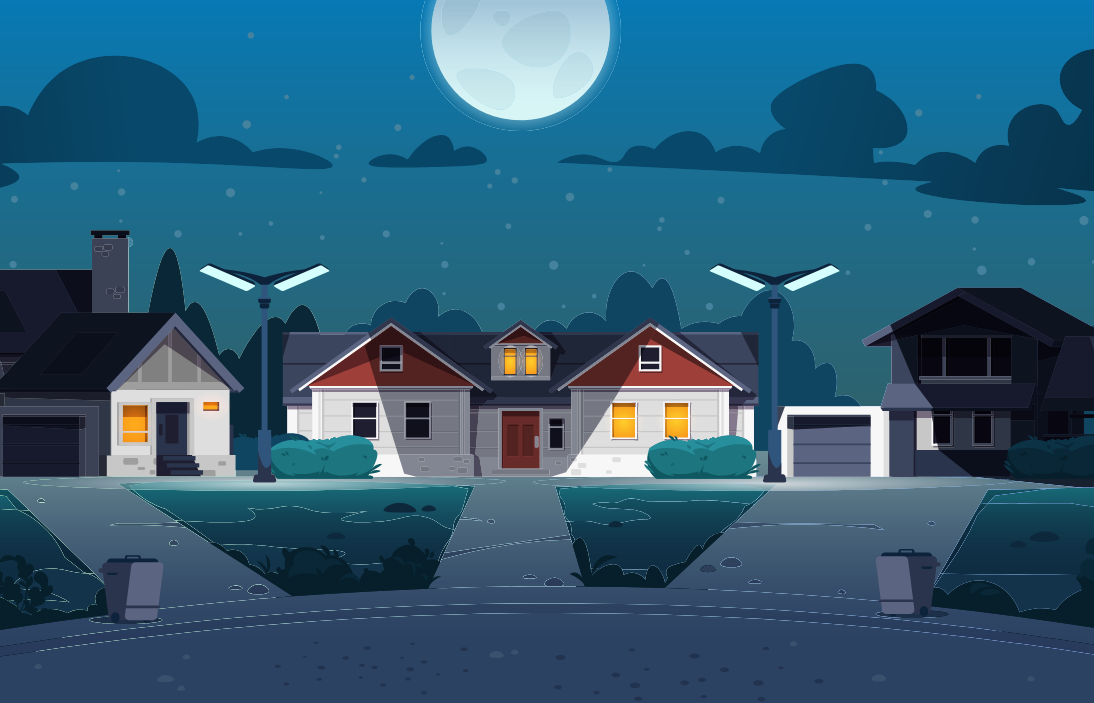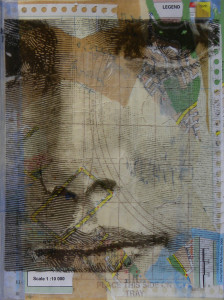In the bedroom they used to share, the real estate agent opens the blinds, letting in the mid- morning sun, then walks toward the desk and jots down her first notes: Office chair required. Small plant. Too many books. She removes three books from the stack on the desk and hands them to George, then does the same at the bedside table. She points to the family photo—the only time George and Julia had hired a professional to take a photo of the five of them—which is hanging above the bed and tells them that buyers will want to picture themselves in the house, not be reminded of its past inhabitants, no matter how happy they appear. Obediently, George lifts the frame from the wall, and promises he’ll fill the hole that the nail left behind. Next, she walks to the master bath and complements them on the renovation—the removal of the bathtub to house a walk-in shower, and the installation of a teak bench—added to accommodate Julia’s limited mobility, while modern-looking enough to conceal the fact that it was built for a wheelchair user. No one would ever know a disabled person lives here, she says, and Julia feels her cheeks redden, hoping neither she nor George notices.
Halfway across the city, Marnie packs three lunch bags with granola bars and a can of soda water. There is no sandwich meat, or bread for that matter, so she adds a few Kraft Singles to each bag. She’ll have to remember to stop by the grocery store the next time George’s kids sleep over.
She needs a coffee. She hadn’t slept after she and George argued last night, and he hadn’t given her the opportunity to confront him this morning about the email she received. He left early, sneaking out while she and the kids were still asleep. He had left her a note on the kitchen table, saying he had a breakfast meeting with his business partner, then had to meet Julia at the house––the house Julia was still living in, the house he had promised would be Marnie’s and his. When she had first agreed to move-in into that tiny rental condominium overlooking the freeway, she thought it would be for only a few months. George was about to leave Julia, but then Julia had her accident and his decision to move in with Marnie took another three months. It was now a year later, and the terms of George and Julia’s separation was still not agreed upon. And it was a year since Marnie had uprooted her life, put her things in storage and moved three hours away from her friends to the city.
As with most mornings that George had the kids, he was too busy to drop them to school, so she was stuck with this task, and despite the drive-thru breakfast she offered the three boys, they had refused, claiming that they didn’t want to be late for school again. Marnie was sure their mother had put this idea into their heads. She wondered what it mattered if they missed the principal’s announcement or the playing of the national anthem. Her own mother had never taken her out for breakfast on the way to school. She had gotten herself up each morning and poured her own bowl of cereal, sometimes without milk, if her mother hadn’t had time to pick it up, and she got herself to school. She hadn’t had the luxury of being driven door-to-door.
The real estate agent meets the auctioneer at the front door and lets her in. George and Julia wait upstairs, in the hallway, where a mezzanine overlooks the kitchen and entranceway. Julia notices that both women are dressed impeccably, in tailored suits and heels and also that they both left on their shoes, despite the mat at the front door with the row of kids’ sneakers. Even George had removed his shoes, probably out of habit. Both women are around Julia’s age and yet she feels dishevelled in comparison. She’s sure, based on the smooth, flawless texture of their skin, that they have discovered some magic anti-aging cream, or maybe they’ve even used filler. It seems like everyone in Julia’s world, including her closest friends, have turned to Botox recently. It’s something Julia has never considered; she already sees far too many health care practitioners and doesn’t have the interest in adding another, or the funds for that matter, now that she no longer has an income.
Julia’s personal care worker had called in sick this morning, of all mornings, so she feels particularly self-conscious about the fact she is wearing the t-shirt she wore to bed last night, and although the joggers she pulled on were fresh out of the dryer, there was no hiding that they were still joggers. She had washed her face and added a drop of foundation under her eyes to cover the dark circles, then applied mascara and lip gloss, and she was impressed with herself that she had managed all of this by herself, all before nine o’clock, when George arrived with the real estate agent. Still, when she compared herself to these women, or even the woman that she used to be, she found herself envious of them and of her past self. These feelings and comparisons dampened the satisfaction she had felt earlier about her improved independence since George had moved out. She had hoped he might notice the improvements, but he had barely made eye contact with her all morning.
The boys sit silent in the back seat, uttering not a word as Marnie pulls into the drive-thru line. There are ten cars ahead of her, and she mutters to herself that there should be a separate line for those that only want to order a cup of coffee. The silent treatment the boys seem to be giving her, is another skill their mother has surely passed on to them. Marnie couldn’t remember the number of times she had tried to contact Julia––morning, night, a couple of times in the middle of the night when George was asleep beside her––and she hadn’t picked up. There were things she wanted to ask her, things George had told her about their marriage and about the accident that she wanted clarified. She had also wanted to befriend Julia. She wanted to urge her to settle on the separation, come to an agreement about the kids and the house. She wanted to tell her that she and George would help her find a more manageable home, one that didn’t require maintenance like snow shovelling, and raking in the fall, things she was incapable of doing. But now it was too late. Julia never answered her calls or even the letter she had hand-written her and left in the mailbox. At the court hearing last week, it had been determined that the house should be listed for sale, so they could divide the assets. Everything Marnie had been promised––the house, a future with George, helping raise his kids––was up for question. And that email she received yesterday by a woman (or girl––she was only twenty-two) who claimed to be carrying George’s baby and that they were planning to marry, made her stomach roll. It was probably fake, but then how did she know so much about George––where he worked, that he had three children and was getting divorced? She even named the conference where she claimed she had met him, a conference Marnie was supposed to attend with him four months ago but had to cancel when she came down with a severe case of alcohol poisoning from a bottle of wine that had spoiled. And why was George so evasive about discussing the details of the email, or denying this woman existed? Marnie would text him and get to the bottom of it.
The auctioneer waves up at Julia and George, who is busy looking at his phone. She says she’ll start on the main floor and work her way up, to stay out of their way, and the real estate agent continues to jot down what items she will add and remove to stage the house for buyers: Wheelchair/walker to go in basement closet during open house. Remove front door mat and shoes. Replace tattered books with decorative faux ones.
Julia is using the power wheelchair this morning, so that she can keep up with the regular walking speed of the others. It takes up half the width of the hallway, and an acorn is stuck in one of the wheels, so it makes a clicking sound as it rolls along the floor. She really must get that looked at, she thinks, and ponders if she should have used the walker instead. Then she would be eye-level with everyone, and it wouldn’t strain her neck to look up at them. She always finds that when she uses the walker, people are more relaxed around her, as if her disability is less-so or temporary. What she does appreciate about the powerchair is that it gives her a calculable degree of reassurance that she won’t trip or fall, and she can get away fast, when her emotions fail to offer the same predictability.
It is as if all of the psychological endurance she had maintained after finding out about George’s affair, surviving her accident a few days later, then the subsequent weeks in the hospital––away from the kids, no longer being able to read to them or tuck them in at bedtime––descended on her like a landslide, after he moved out. Weeks before the accident, he had begun to travel more, arrive home from the office late, answer phone calls in the middle of the night, but she misunderstood this for busyness, because his career was taking off. She feels guilty about the accident, and about him staying after. And despite the driver not even realizing he had run her off the road and into the culvert where her neck collided with concrete, Julia blames herself. If she hadn’t been running with her headphones on, she might have heard the car approaching, and have been able to get out of the way in time. Still, the doctors had said it was a miracle she survived, and George seemed so relieved when she awoke after the six-hour surgery which fused two of her vertebrae. So when he did leave, she had cried for what felt like days, and it came out of nowhere, as if her remorse about what she had put George and the kids through, had suddenly escaped her body in one swift undercurrent and dragged her courage along with it. Since then, a sappy commercial or a comment made by a stranger when she’s at the park with the kids alone (God bless you! or How do you manage without a partner? or I didn’t realize disabled women could have children) triggers inconsolable weeping, or worse, a burst of anger that is unfamiliar to her and makes her say things she later regrets.
Marnie watches as the kids walk up the winding path beside to the school playground, toward the locked entrance, holding hands, Sébastien, the oldest, in the middle. He is only in grade two and yet seems so responsible, perhaps more so than his father. She is starting to wonder if George handpicked her to be both his babysitter and personal secretary. After the court hearing last week, he fired his lawyer when the judge deemed him responsible for paying the mortgage on the house, even though he’s not living in it, at least until he and Julia settle on an arrangement. Since then, he has Marnie interacting with Julia’s lawyer, acting as his representative, despite her lack of legal education or expertise.
There are other things that make Marnie question the future of their relationship. When she and George first got together, after meeting through a dating app, they had sex anywhere and everywhere they could, such as in his car at the abandoned warehouse under the expressway, where he first told her he loved her, and in the washroom of the coffee shop next to the community centre, where they would meet on Sunday mornings while the kids were at swimming lessons and art class. He had even snuck Marnie into the basement of the house through the patio door off the back deck, and she found this exciting. The kids were fast asleep, as was Julia, just home from the hospital, and it was like they were completely alone. He had chilled a bottle of wine, and lit tea light candles in her favorite scent—verbena—a romantic and thoughtful touch. But lately, sex had become infrequent and laboured, as if being intimate was just another task added to his list of obligations—paying for two homes, the unrelenting sales quota imparted on him at his interactive firm, and the out-of-town tech conferences he was asked to speak at—and he reminded Marnie often that he was also covering her expenses because she had been unable to find a job since moving to the city. Marnie tried to be understanding. The past several months had not been easy on him—his soon-to-be ex-wife was paralysed, he had one less income since she was unable to return to work, and he had taken on caregiver roles for both Julia and three kids under the age of seven. Marnie had always wanted kids, but she had envisioned sharing the parenting, not doing it alone. She had thought it would be just a matter of time before they could merge their belongings and move into the house, but every month that her storage bill popped up in her email, she was reminded that she was living by his terms, not hers.
Julia had spoken on the phone with the auctioneer yesterday, and had forewarned her of her condition, as she had the real estate agent last week. She felt it made the first interaction with a stranger less awkward and it was a way in which she could protect her own sense of unease, give her back a bit of control. Though it had been almost a year since her accident, her self-confidence hadn’t returned to her and she preferred, as she figured others might, to not make the focus of conversation about her disability, perhaps even pretend it wasn’t there.
The auctioneer was called in because the real estate agent suggested the house would appear more valuable and likeable with less in it. She wanted it to be cleared out and she had a warehouse full of more suitable furniture and decor that she would use to stage it for potential buyers. The auctioneer would host an estate sale this weekend. There was little Julia and George wanted to retain for themselves. He picked the chef’s knives and the painting he had purchased for Julia on their second anniversary––it had always been more his taste than hers. Julia could no longer drive so he also kept the sedan and despite its exterior which had begun to rust, he was really attached to it. Julia’s only insistence was that she wanted the boys’ room to stay intact, at least until the move, and suggested it might be best to close their doors during the sale so that no one ventured into their space. It was furnished with double bunk beds, stuffed animals, a collection of Lego, and on the sky blue walls hung art they had created at the community centre. She felt the boys’ lives had already been displaced enough with the back-and-forth between two homes.
They split the dozen bottles of wine that remained from the purchases they had made during the twelve years they had been together––mostly sentimental finds from trips to Niagara and the Finger Lakes, and bottles they purchased at the liquor store, corked on their children’s birth years. Julia agrees to keep hers, unopened, in the wine fridge at the house. She hasn’t had a glass of wine in months; it doesn’t mix well with her medications. This satisfies the real estate agent. It is one thing less for her to stage. Everything else they will sell or donate. It seems like the simplest way to divide things.
A woman, maybe a teacher or the school secretary, greets the boys at the school entrance and ushers them in. She looks out at Marnie and sends an unenthusiastic wave, which when mingled with a look of disapproval, possibly even a scowl, makes Marnie infuriated. She wonders why everyone is dismissing her today. She presses her foot to the gas, and the car lurches forward, the tires squealing. Only the crossing guard seems to notice. The boys don’t turn around to look her way
The real estate agent and the auctioneer compare notes and discuss the timing of the estate sale and the open house that will follow. Julia finds herself alone with George and is unsure as to what to say to him, feeling as though this is goodbye, at least in the marital sense. She wants to thank him for sticking around and caring for her after her accident. At the same time, she is unable to forgive him for having the affair, agreeing to stay and then commencing it again while she was in the midst of dealing with her injury. She also wants to tell him she’s ready to move on, that she’ll be okay, that they’ll work out an equitable separation, so they are both big parts of the boys’ lives and that she’ll even consider meeting Marnie. God knows she’s been avoiding her for months and here she has been helping with the kids. The boys, especially Sébastien, has expressed a dislike for Marnie, and Julia feels she has had a role in this, and is something she needs change. The truth is, George wasn’t always easy to live with and the trust died years ago for Julia. She finds herself happier now, despite her disability, than when she was married. The accident made her realize that she values motherhood more than anything and her home is where her children are. But before she has a chance to say anything, George’s phone chimes. He looks down at it, then moans something about the office needing to reach him. He slides his shoes on, reaches for the door handle, and waves a goodbye to the three women, not looking back.
Marnie doesn’t get any further than the stop sign before she pulls over. She hears her phone chime and sees that it is George. He has finally answered her text messages. It begins with heart emojis, then an eggplant and this makes Marnie chuckle. He says he has no idea who the young woman is that sent Marnie the email, that it’s probably a practical joke conjured up by the guys at work. He’s sorry he hasn’t been as much help to her as he should, that he feels things are finally moving in the right direction. He has a plan to keep the house and get custody of the boys. He wants to tell her all about it. He hopes she’ll meet him at the place where he first told her he loved her. Marnie lets out a sigh of relief. She never had anything to worry about with George. He’s an incredible, sexy, successful man with three children who will one day call her Mom. On her way to the abandoned warehouse, Marnie runs into the grocery store and picks up bread, sandwich meats, juice boxes, cereal, milk and instant coffee.
As George pulls out of the driveway, Julia decides it’s a good time to call Marnie, before she changes her mind. She looks in her missed calls, finds Marnie’s number and presses the dial button.
Marnie parks her car, checks herself in the rear view mirror and applies red lipstick, George’s favorite. She sees George’s car pull into the lot a hundred metres away and gets out of her car to greet him. Her phone buzzes and she reaches into her jean pocket to get it. She stares at her name on the screen, stunned. It’s Julia. Things are finally about to turn in Marnie’s favour and she’s not sure she needs or even wants to talk to her now. When she looks up a few seconds later, George’s car is racing toward her at far too fast a pace. He seems to have lost control of it. Or he’s fully in control. Yes, the look on his face as her charges toward her, tells Marnie he knows exactly what he’s doing.
Marnie doesn’t answer her phone call and Julia understands. Both the real estate agent and the auctioneer have just left. It’s 2:45 and she locks the house, then manoeuvres her wheelchair down the front ramp to the sidewalk, and heads toward the boys’ school, just up the street. It’s a beautiful day and she thinks she’ll take them for ice cream, then to the park before going home. Perhaps they’ll take turns sitting on her lap. She has to have a tough conversation with them about the selling of the house, and she wants to ease into it.





